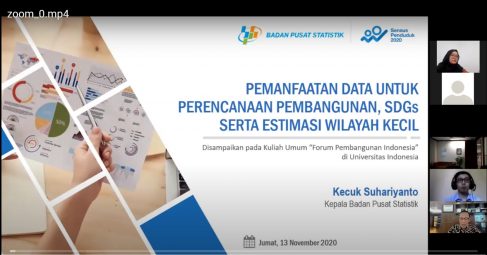MEKK Public Lecture with the Head of BPS “Data Utilization Activities for SDGs Development Planning and Small Area Estimation”
Hana Fajria – Public Relations of FEB UI
Depok – (13-11-2020) The Magister Program in Population and Labor Economics (MEKK), Faculty of Economics and Business, Universitas Indonesia, held a Public Lecture webinar, with the topic “Data Utilization Activities for SDGs Development Planning and Small Area Estimation”. Dr. Kecuk Suhariyanto, Head of the Central Statistics Agency (BPS) attended as a speaker. The event was moderated by Dr. Dwini Handayani, Chair of the Master Program in Population and Labor Economics Study Program, on Friday (11/13/2020).
Suhariyanto explained the role of data in the development and utilization of data in the midst of the pandemic. He explained that data plays a central role in planning, monitoring and evaluating policies, such as materials for planning, monitoring and evaluation and policy making, on development targets. Data is also important for macro assumptions in the preparation of the APBN (Government and House of Representatives/DPR), and becomes the goal of sustainable development, as well as sectoral policies, Ministries/Agencies, and other regional governments.
“Before using the data, we should first understand the meta data. It will explain how the data is collected, in the form of the number of samples, the types of collected variables, the concepts and definitions used, as well as various indicators that can be published from the data. Second, to understand a data, it is necessary to break down the data in as much detail as possible, following the characteristics or direction of the analysis used,” said Suhariyanto.
According to Law No. 16 of 1997 on Statistics, statistics are divided into 3, namely Basic Statistics (data from BPS) for broad purposes, both for government and society, cross-sectoral, national and macro scales; second, Sectoral Statistics to fulfill the needs of certain agencies in the implementation of government and development tasks; third, Special Statistics (data from individuals/communities) to meet the specific needs of the business world, education, socio-cultural, and other interests in people’s lives.
Furthermore, Suhariyanto explained the decentralization for data needs at a smaller level, such as districts/sub-districts/villages by using Small Area Estimation (SAE). SAE aims to estimate urban development indicators down to the sub-district level, when the use of indicators tends to produce numbers that are larger than the actual (overestimated) figures. The SAE method calculates the direct estimate using the National Socio-Economic Survey (Susenas). The main challenge is to get auxiliary variables that reflect regional characteristics.
Suhariyanto advised that researchers/students can continue to conduct their research in the midst of the pandemic, with several research methods that can be used as alternatives, one of which is by utilizing big data. “With this data source, we can get a measurement revolution that we can use to measure patterns, map people’s behavior, public opinion, etc.” he said in closing the session. (hjtp)
(am)




